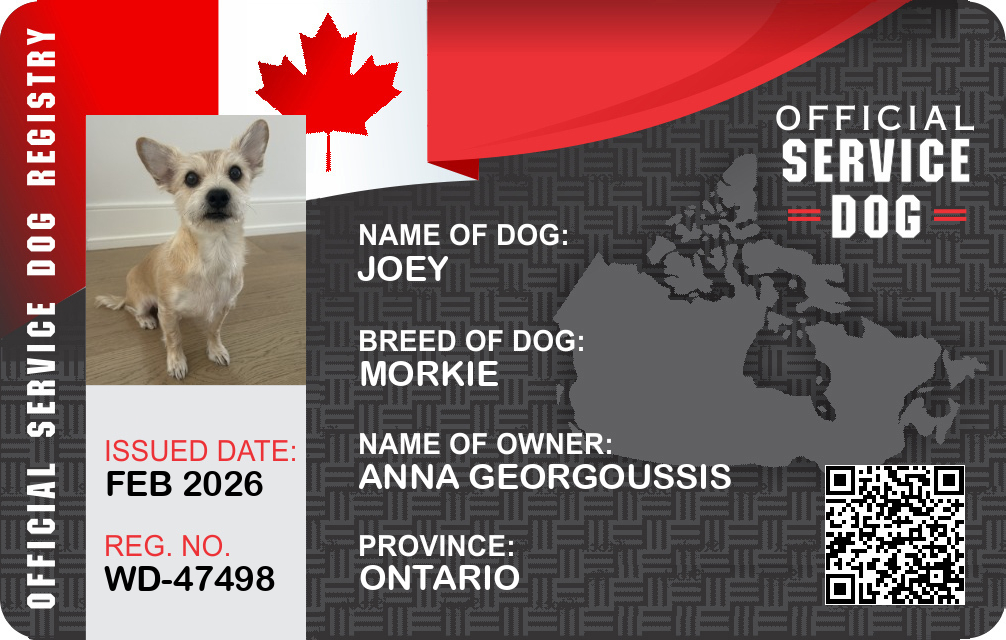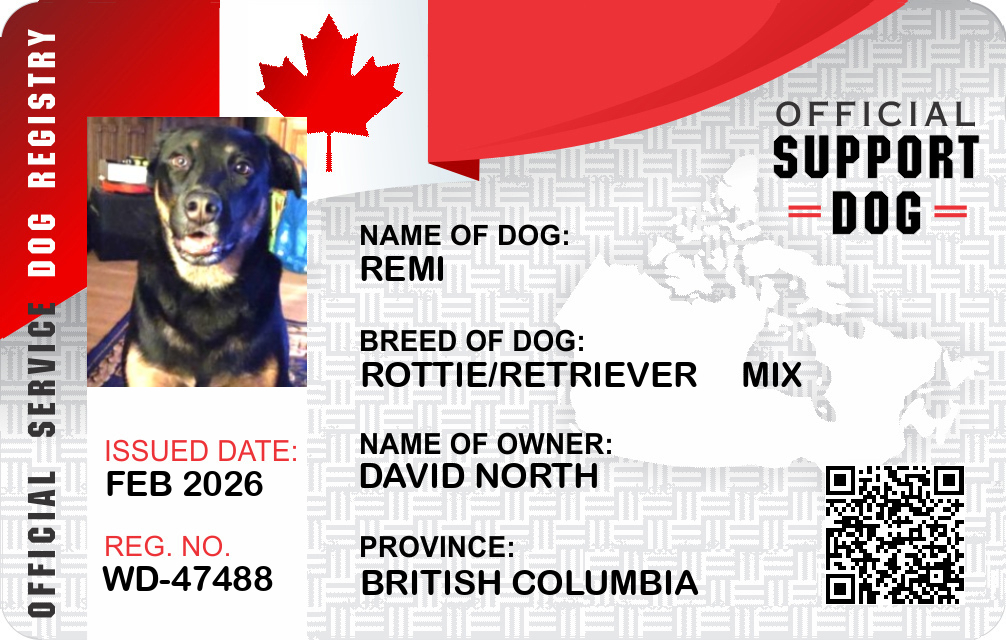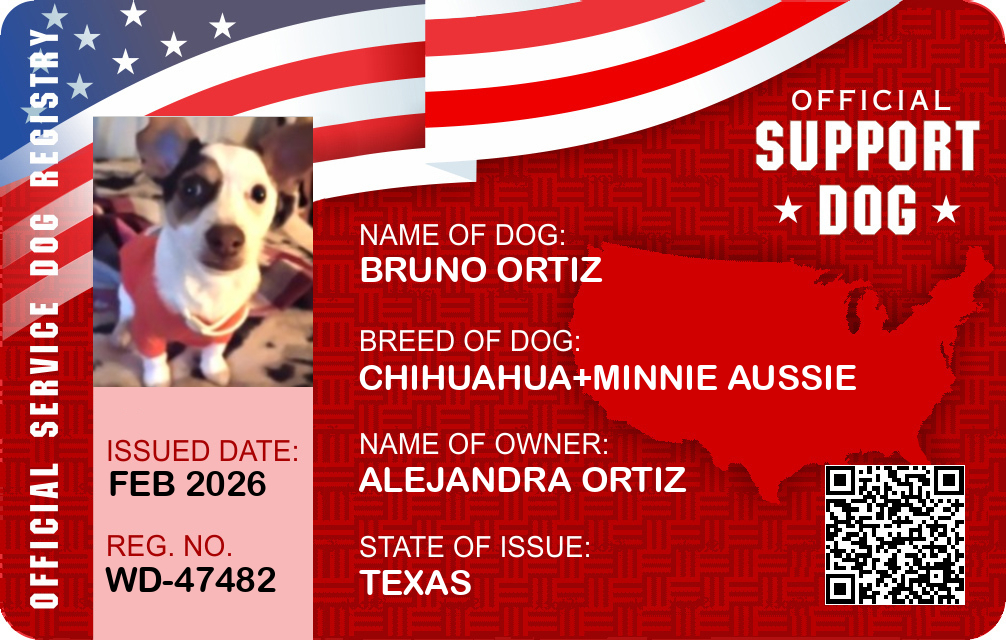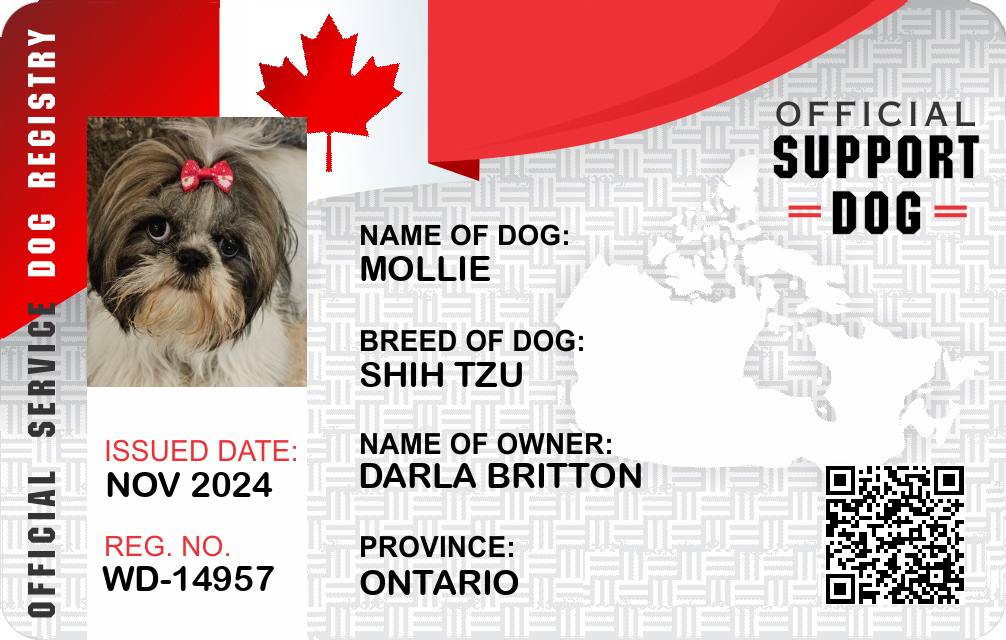Michigan Service Dog Laws
Get Your Documents
Example State Cards

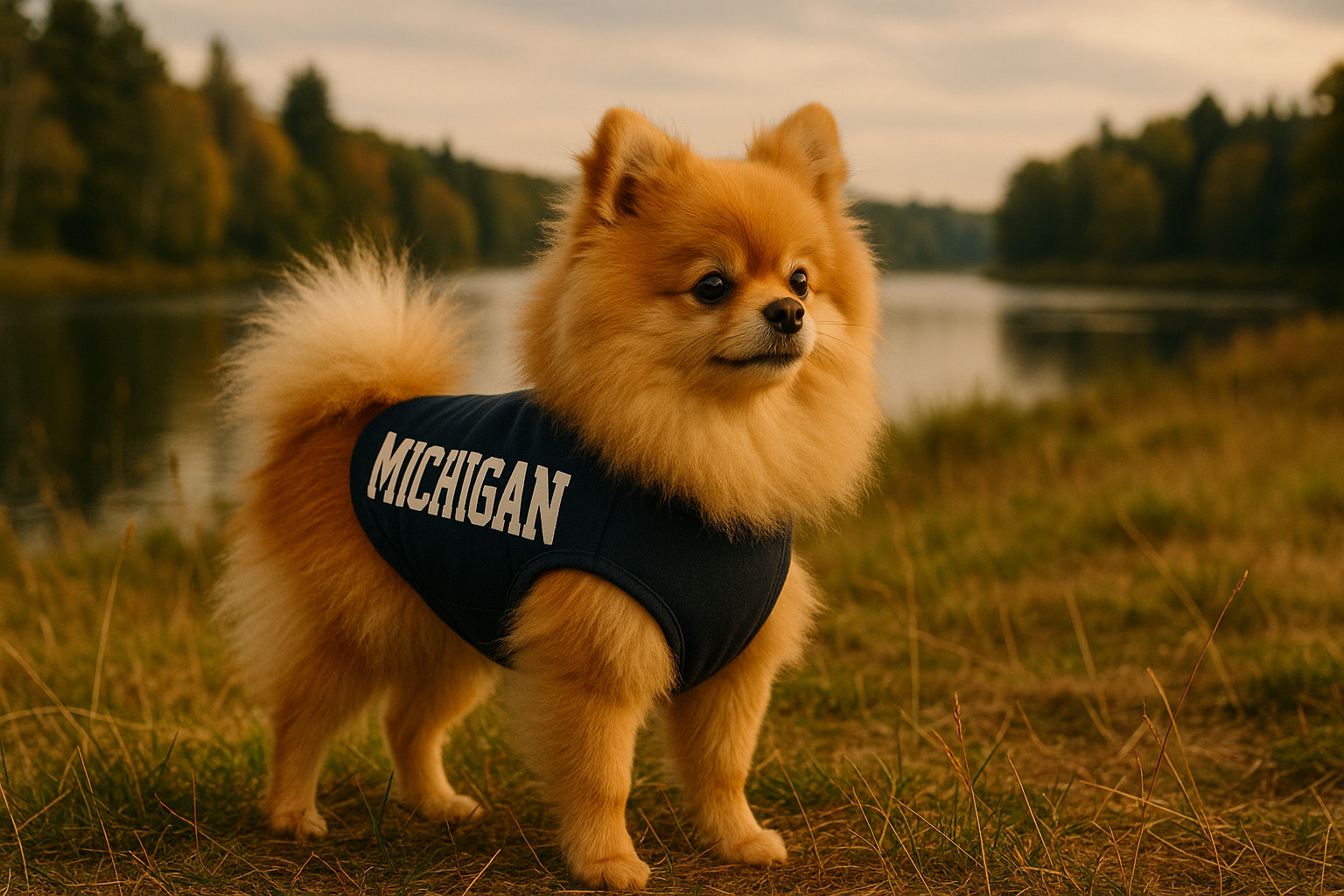
Overview of Service Dog and Legal Definitions in Michigan
What is a Service Dog?
A service dog, as defined under the Americans with Disabilities Act (ADA), is a dog that is individually trained to do work or perform tasks for a person with a disability. The tasks performed by the dog must be directly related to the person’s disability. In Michigan, this definition is consistent with federal guidelines, ensuring that service dogs provide practical assistance to individuals with physical, sensory, psychiatric, intellectual, or other mental disabilities. For instance, a service dog might retrieve items, guide a person who is blind, alert someone who is deaf, pull a wheelchair, or provide stability for a person with mobility impairments.
How Service Dogs Differ from Other Types of Assistance Animals
Service dogs are specifically trained to perform tasks for individuals with disabilities, setting them apart from other types of assistance animals such as therapy animals or emotional support animals (ESA). While therapy animals often provide comfort and support in settings like hospitals or schools, they do not have the same access rights as service dogs. Emotional Support Animals, while offering emotional or mental relief to their handlers, do not receive the extensive training that service dogs do to perform specific tasks and are not granted the same broad public access rights under federal law.
Key Federal Laws Affecting Service Dogs (e.g., ADA, FHA, ACAA)
Several federal laws establish rights and protections for service dogs and their handlers. The Americans with Disabilities Act (ADA) is the primary federal law regarding public access rights for service dogs. It ensures that handlers are allowed to bring their service devices into businesses and public spaces. The Fair Housing Act (FHA) provides guidance on housing accommodations, ensuring that landlords and housing providers make reasonable accommodations for individuals with service dogs and, in some cases, emotional support animals. The Air Carrier Access Act (ACAA) sets the regulations for service dogs on airlines, allowing them to accompany their handlers in the cabin without additional fees. Each of these laws interacts with and, in many cases, supersedes state laws, including those in Michigan, providing a baseline of protection for service dog handlers across the nation.
State-Specific Service Dog Laws in Michigan
In addition to federal protections, Michigan has its own laws regarding service dogs. These laws align closely with federal regulations but also provide further clarification and specific provisions relevant to residents of Michigan. For example, Michigan law indicates that a person with a disability is entitled to be accompanied by a service dog in all areas of public accommodation and facilities, reinforcing the rights established under the ADA.
Housing Rights and Responsibilities
The Fair Housing Act (FHA) protects the rights of individuals with disabilities to keep service dogs in their residences, even in dwellings with no-pet policies. In Michigan, landlords are required to make reasonable accommodations for service dogs, ensuring that individuals with disabilities can live with the assistance they need. Landlords cannot charge extra fees or deposits for service dogs, but tenants are responsible for any damage caused by the service dog beyond typical wear and tear.
Housing providers are allowed to request documentation to verify the need for a service dog if the disability is not immediately apparent. This documentation does not need to be comprehensive but should come from a qualified professional who can attest to the handler’s need for the service dog.
Public Access and Accommodation
Under both federal and Michigan laws, service dogs must be allowed to accompany their handlers into all public spaces and businesses, including restaurants, hotels, retail stores, theaters, and public transportation. Service dogs must be under control and, generally, be harnessed, leashed, or tethered, unless such devices interfere with the service animal’s work or the individual’s disability prevents using these devices.
Businesses and entities can only ask two questions if it is not readily apparent that the dog is a service animal:
- Is the dog a service animal required because of a disability?
- What work or task has the dog been trained to perform?
They may not ask about the person’s disability, require medical documentation, require a special identification card or training documentation for the dog, or ask that the animal demonstrate its ability to perform the work or task.
Transportation and Travel Rules
The Air Carrier Access Act (ACAA) ensures that individuals with service dogs can travel in airline cabins without being charged extra fees for their canine companions. Airlines may ask for documentation or proof that a dog is a service animal, especially on international flights or if the airline has reason to question the legitimacy of the service dog. Passengers are advised to notify airlines in advance when traveling with a service dog to ensure a smooth boarding process.
In Michigan, public transportation agencies must accommodate service dogs, granting them the same rights as their handlers under federal and state laws. No additional fees can be charged for service dogs utilizing public transit, ensuring that mobility is not financially burdensome for individuals with disabilities.
Employment and Workplace Considerations
Under the ADA, employers in Michigan must provide reasonable accommodations for employees with disabilities, including allowing service dogs in the workplace. Employees seeking to bring a service dog to work should engage in an interactive process with their employer to outline the specific accommodations required. Employers can request documentation to verify the employee’s need for the service dog if the reason is not apparent.
Employers should focus on whether the service dog serves a legitimate role in addressing the employee’s needs and whether the presence of the dog introduces any undue hardship or safety hazard. Offering employees access to their service dogs supports inclusion and ensures compliance with federal and state anti-discrimination laws.
Documentation, Requirements, and Processes in Michigan
Service Dog Documentation and Who Can Issue It
While Michigan does not require registration for service dogs, certain instances—such as securing housing or traveling—might necessitate documentation. Documentation generally consists of a letter from a licensed healthcare or mental health professional who is familiar with the individual’s disability and need for a service dog. This professional could be a doctor, therapist, psychiatrist, or any medical professional connected to the handler’s care.
Landlord, Business, and Provider Verification Rules
Landlords and service providers in Michigan can request documentation to support a service dog accommodation request. This documentation must articulate the handler’s disability-related need for the service dog without requiring disclosure of detailed medical history. When interacting with businesses or employers, handlers need not present any identification or certification for their service dog, staying in line with federal ADA guidelines.
Rights, Limitations, and Legal Risks
Rights Service Dog Handlers Have in Michigan
Service dog handlers in Michigan enjoy broad rights to access public places, retain housing with their service animals, and find accommodations in the workplace—consistent with federal laws. These rights are integral for ensuring that handlers can lead independent lives without undue barriers posed by the lack of accommodations for their service animals.
Limits on Service Dog Protections and Common Restrictions
A few limitations exist concerning service dog accommodations. For example, service dogs must be housebroken and under control at all times. If a service dog is out of control or poses a direct threat to the health or safety of others, businesses and entities can refuse access or remove the animal from the premises. However, they must provide the handler the opportunity to obtain goods or services without the animal’s presence.
Penalties for Fraud or Misrepresentation
Misrepresenting an untrained pet as a service dog is unlawful and can carry serious penalties in Michigan. Individuals who falsely claim their pet as a service animal may face fines, community service, and other legal consequences designed to deter and address fraudulent practices. The legislation serves to protect genuine service dog handlers from the challenges posed by imposters, ensuring these indispensable animals are respected and accessible to those who need them.
Practical Guidance for Service Dog Handlers in Michigan
How to Qualify for a Service Dog Legitimately
Michiganders seeking a service dog should consult with a healthcare provider to evaluate their need for such an animal based on their disability. A legitimate qualification involves a comprehensive assessment from a licensed medical or mental health professional who can advocate the requirement for a service dog due to a specified disability-related need.
How to Talk to Landlords, Airlines, and Employers
Effective communication is crucial when interfacing with landlords, airlines, and employers. Be prepared to provide relevant documentation that asserts your right to have a service dog. Practically, engage in dialogue that seeks to clarify roles, responsibilities, and any necessary accommodations while respecting the legal boundaries established for both service dog handlers and service providers. Ensuring open communication can ease tensions and reduce misunderstandings that may arise.
Summary of Service Dog Laws in Michigan
- Service dogs are specifically trained to perform tasks directly related to a person’s disability.
- Federally, these dogs are protected under ADA, FBI, and ACAA, offering broad access in public spaces, accommodation in housing, and rights during travel.
- Michigan adopts these broad federal protections into its laws, ensuring no additional state-specific barriers for service dog handlers.
- Employers must provide reasonable accommodations for service dog handlers, barring undue hardship to the business.
- Documentation is commonly required in housing and travel; however, public accommodation generally cannot demand proof of a service dog’s status.
- Misrepresenting a pet as a service dog can incur significant penalties, emphasizing the need for a clear delineation between service dogs and other assistance animals.
- Service dogs must remain under control and non-disruptive, or they may be lawfully removed from premises.
- Accessible and collaborative communication plays a vital role in maintaining cooperative relationships with landlords, employers, and businesses.
By understanding these guidelines, service dog handlers in Michigan are better prepared to navigate legal landscapes effectively and foster environments of greater accessibility and respect for persons with disabilities and their service animals.
Get Your Documents
Example State Cards





